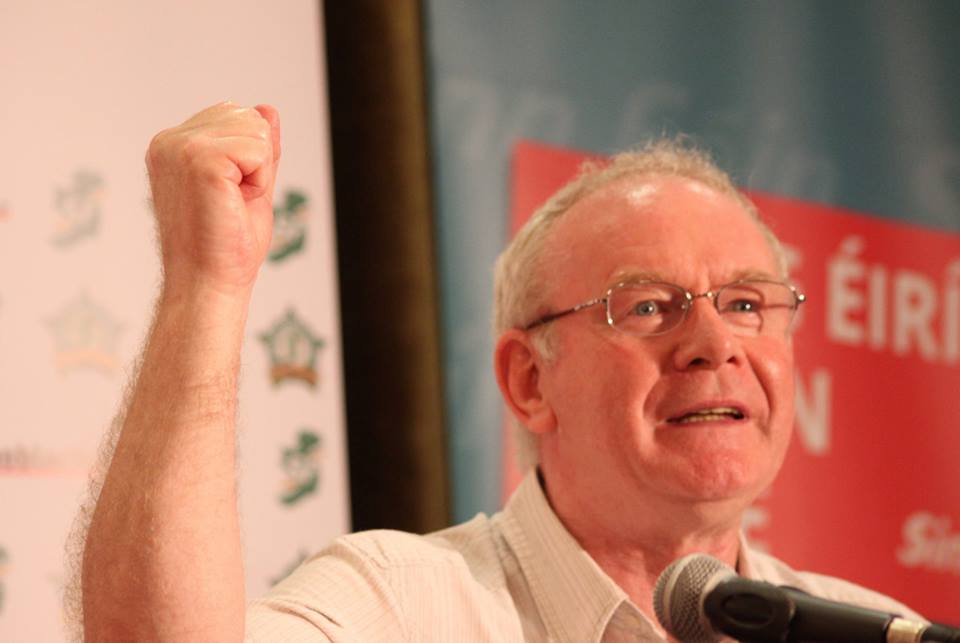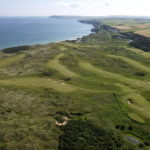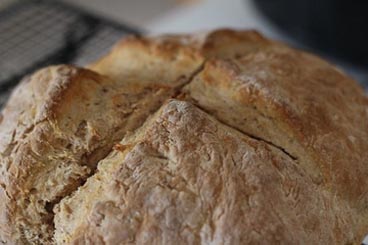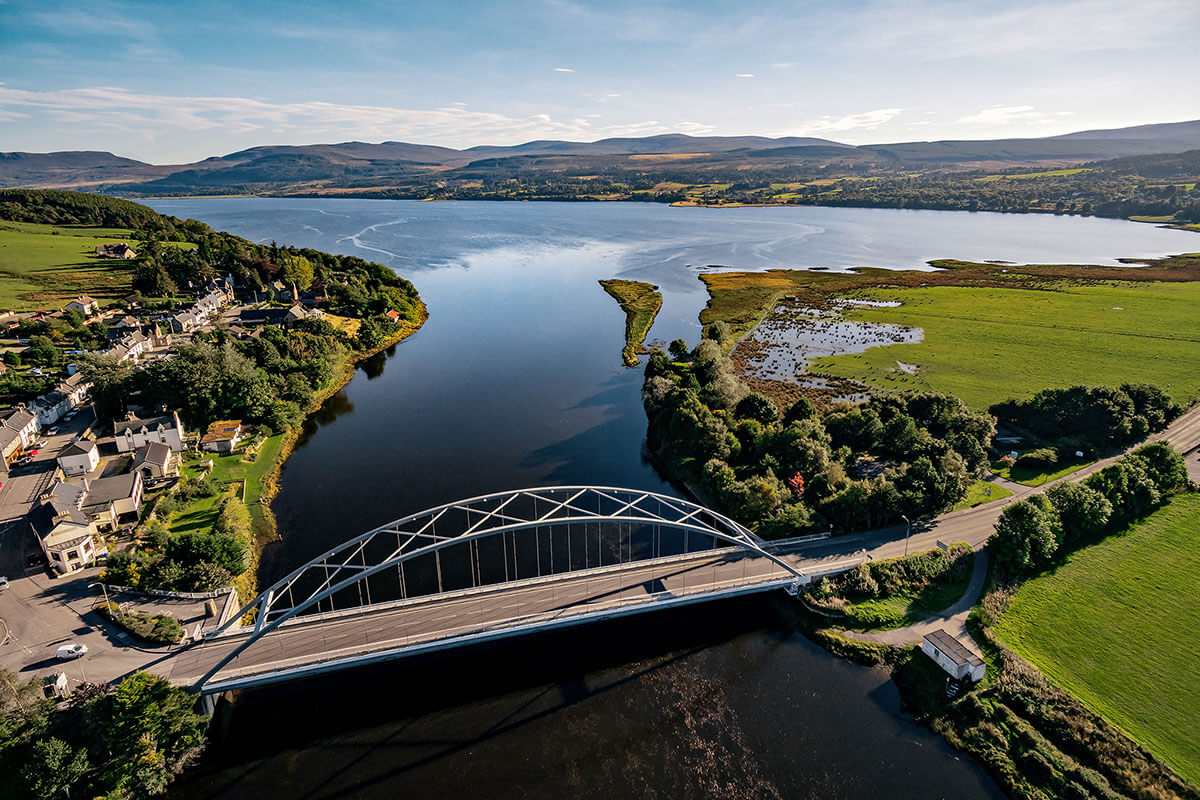By Desmond Devoy
“What’s done is done, what’s won is won.”
The lines were uttered by Martin McGuinness in October 2011, as he cruised through the count centre in Dublin for the Irish presidential election.
That he was there with his Sinn Fein friends was no surprise.
That he was there on the ballot paper itself as a candidate, and having made it to the third count before being eliminated, was a surprise to many.
Shaun Connolly, covering the scene for the Irish Examiner, noted that McGuinness was quoting a fellow Derryman, Phil Coulter, and his 1973 song about their hometown, “The Town I Love So Well.”
But, McGuinness “did not need to deliver the next line (in the song) to sum up the six contenders blown out of the race by the quiet storm of Michael D (Higgins): “And what’s lost is lost and gone forever.”
No race, no journey, lasts forever, and win or lose, it must end.
McGuinness died after a short illness back in Derry City on Tuesday, March 21, at the age of 66. Later that very same day, Ireland’s ambassador to Canada, Jim Kelly, paid tribute to the man who was, at different points, a butcher’s apprentice, an Irish Republican Army chief of staff, a prisoner, a negotiator, education minister and, finally, from May 2007 to just this past January, Northern Ireland’s Deputy First Minister.
As Kelly wrapped up his speech in Ottawa’s diplomatic enclave of Rockcliffe Park, he noted “with sadness,” the passing of McGuinness, and echoed his desire “to express the condolences of the Irish government to his family.”
Kelly noted that “it is for historians to make judgements on the often complicated and complex lives of public figures,” he said. Kelly said that, “what struck me most,” in reading many of the commentaries on McGuinness, his life and legacy, was the reflection on “the remarkable political journey that Martin McGuinness made over his lifetime, and the evident sincerity of his personal commitment as Deputy First Minister to work for peace and prosperity for all of the people of Northern Ireland, and to try to make it a better place for all, regardless of background or tradition.”
The journey begins
While it was Christy Moore who sang at McGuinness’ graveside on March 23 – and the song then was “The Time Has Come” – Coulter’s song perhaps best sums up the early days of The Troubles, and what brought McGuinness, as a teenager, to join the IRA in the first place.
The song touches on images McGuinness would have strived to keep alive in the public’s mind, about “the armoured cars and the bombed-out bars/And the gas that hangs on to every breeze. Now the army’s installed by that old gas yard wall/And the damned barbed wire gets higher and higher. With their tanks and their guns, oh my God, what have they done?”
But while the British Army did their bit to bring “a town…to its knees,” McGuiness had his own part in shaping the images to be found in those words. In 1972, the IRA “succeeded in reducing the centre of Derry to rubble,” according to Patrick Bishop and Eamonn Mallie’s 1987 book The Provisional IRA. “They ‘managed to bomb the city centre until it looked as if it had been hit form the air.’”
In many ways then, it was an interesting, and ironic, choice of song for him to be referncing at an election count.
Much was lost, and much was gained, during Martin McGuinness’ time in Irish politics and, before it, in armed struggle. Many lost because of his brutal and calculated decisions. Many gained, and continue to do so, because of the peace he helped achieve, not entirely on his own. But it would have been much, much harder to achieve the peace without him.
This much we do know – his legacy is for the history books now, his race is run. Media reports state that he had intended to step down as Northern Ireland’s Deputy First Minister this coming May, marking 10 years in the office, another unlikely step by that most unlikely of men.
But ill health stole his thunder, for once.
Even so, McGuinness proved, with his resignation, as before, that he still had one more surprise up his sleeve.
Having just gone to the polls in May of 2016, most northerners entered the New Year having sung of a silent night. Their Christmas may have been quiet – but McGuinness, made sure that that the New Year would be anything but, with his startling resignation on Monday, Jan. 9.
How much of it was because of his health, or because of genuine concerns over how Democratic Unionist First Minister Arlene Foster handled the so-called “Cash for Ash” scandal, we may never know. But as parties prepared for a second election in under a year, McGuinness returned home in January, telling a rally upon his return that “my heart lies in the Bogside.”
McGuinness was born in Derry on May 23, 1950, one of seven children in a working class family. He left school at the age of 15 after having failed his eleven-plus exams, and trained to become a butcher’s assistant. During the burgeoning civil rights movement in Northern Ireland in the late 1960s, he was drawn to the movement, before eventually joining the Irish Republican Army. His conversion to violence came after sectarian rioting in 1968.
It was a fateful membership, one that would shape the rest of his life, and put him at the centre of one of Ireland’s bloodiest episodes during The Troubles. On Bloody Sunday, Jan. 30, 1972, at only 21, McGuinness was already the Provisional IRA’s second-in-command in Derry when 13 unarmed civil rights protesters were killed by British soldiers during an illegal march (another civilian would die four months later.) A 2010 report found that the British opened fire first, shooting 26 people, and that some of the civilians were running away from the soldiers.
“Martin McGuinness was a natural leader,” wrote Bishop and Mallie. “Despite the fact that he was barely 22, he had an unobtrusive air of authority. He was handsome, and he was willing to take as many risks as the most active of his men…(He) has an appropriately military directness of manner, refined Irish good looks, and startling blue eyes which convey an impression of sincerity and honesty.”
His foes recognized that they were not just dealing with some rock-throwing youth.
“Even the British Army respected his military capabilities; ‘excellent officer material,’ according to a Royal Marine major who fought him during those months,” wrote Bishop and Mallie.
Young as he was, he was later part of an IRA delegation secretly flown to London for peace talks, which proved fruitless. However, he did walk away with one important revelation from his time in the British capital: “The British don’t give easily.”
In 1973, McGuinness was convicted by the Special Criminal Court in the Republic of Ireland, after being arrested near a car containing explosives and ammunition, according to RTE News. By 1974, he claimed he had left the IRA, he was becoming increasingly involved in the IRA’s political wing, Sinn Fein. He was first elected to the Northern Ireland Assembly on Oct. 20, 1982, along with Gerry Adams, when the party picked up five seats. It marked a shift is strategy, from violence, to a more practical, political foundation, a lesson learned from the 1981 by-election of IRA man Bobby Sands to the Westminster Parliament – while on hunger strike at Long Kesh prison.
(In fact, McGuinness stepped down as the IRA’s chief-of-staff in order to run in ’82, though he and Adams stayed on the Army Council.)
McGuinness later contested, and won, a seat on May 2, 1997, in the Westminster Parliament though, in keeping with his party’s position, he, like his friend Gerry Adams, who won in West Belfast, did not take their seats.
In 1998, McGuinness served as Sinn Fein’s chief negotiator, in talks that led to the Good Friday Agreement that April 10, ending years of violence on the island of Ireland. In the power-sharing executive that was formed thereafter, he became the north’s education minister.
In a move that must have given his inner-child a sense of perverse glee, he would, as minister, move to abolish the very same eleven-plus exams he had failed as a child.
The issue of taking guns out of Irish politics lingered though.
It was not all smooth sailing at Stormont Castle, with break-downs along the way in the assembly, and the suspension of the assembly and some direct rule from London. In time though, Sinn Fein ultimately became the largest nationalist party in the north, eclipsing the Social Democratic and Labour Party.
In 2005, he helped secure IRA arms decommissioning, and a year later, put his negotiating skills to the test again when he led his party’s negotiating team in talks that led to the St. Andrew’s Agreement.
While the Royal Ulster Constabulary had been disbanded in 2001, as it was seen as a loyalist-dominated entity that was not trusted by nationalist communities, Sinn Fein took a major step forward in recognizing the new Police Service of Northern Ireland as a legitimate policing force.
In May of 2007, the once unthinkable happened, when McGuinness was elected Deputy First Minister – serving alongside his one-time sworn enemy, Rev. Ian Paisley, founder of the Democratic Unionist Party.
The two became known as the “Chuckle Brothers.” Even though they were miles apart on the issue of the six counties’ place between the two islands, Britain and Ireland, they found that they got along quite well personally and professionally. Legend has it that the first joke between them came shortly after they took office, and Paisley had to sign legislation politely asking the British government to vacate certain offices.
McGuinness, looking down at Paisley’s signature, is said to have asked his old foe: “Is this part of the DUP’s ‘Brits out’ campaign?”
(When Paisley retired, McGuinness, gave him a handwritten poem by Seamus Heaney, a fellow Derryman, born in Castledawson.)
For a man who existed for so long in the shadows, his most enduring image – when not laughing alongside Paisley or conferring stone-faced with Adams at some ard fheis – was on June 27, 2012, when he shook hands with Queen Elizabeth II at the Lyric Theatre in Belfast. He welcomed her to Ulster – in Gaelic, of course.
It is worth remembering that the Royal Family has long been a target of the IRA. There were plots to kill Prince Charles and Princess Diana at a theatre in 1982, according to former IRA man Sean O’Callaghan in his 1998 book The Informer. One of the Queen’s relatives, Lord Mountbatten, was killed by an IRA bomb on his boat in August of 1979 off the coast of County Sligo. Indeed, the IRA planted a bomb at Ulster University’s campus in Coleraine, County Antrim, in 1977. It was kept on a long-term timer – like the one later used in the Brighton bombing in 1984 that nearly killed Margaret Thatcher – and went off, on purpose, the day after the Queen visited the school during her Silver Jubilee tour.
The simple shaking of hands required a bit of tactful diplomacy, and biting of tongues, on both sides.
Other relationships McGuinness had, like his strained relations with Foster, had their roots far back, many years, during The Troubles.
Martin Fletcher, writing in The New Statesman, reminded readers of the attack on part-time policeman John Kelly in 1979. The farmer had gone out to check on the livestock at his County Fermanagh home. Minutes later, he wrote, “his wife and eight-year-old daughter heard shots. Kelly crawled into the kitchen, blood streaming from his head.” Kelly survived the attack, but his daughter, later Arlene Foster, never forgot it.
That would have made Foster’s relationship with McGuinness fraught enough – but “this was a problem,” wrote Fletcher. For you see, in 1986, McGuinness delivered the funeral oration for Seamus McElwaine, an IRA gunman killed in an SAS ambush. To this day, Foster believes that it was McElwaine who pulled the trigger and attempted to kill her father.
Even at that, Foster showed an attempt at reconciliation by attending McGuinness’ funeral at St. Columba’s Long Tower Church. Her arrival was marked by applause.
“There are people in this church today whose presence would have been unthinkable only a generation ago,” said Father Michael Canny during the mass.
(Bishop and Mallie write that McGuinness was the IRA’s chief of staff. McGuinness likely would have given the green light, or at least been aware, of the assassination attempt on Mountbatten.)
A good many unionists, and even more moderate nationalists, abhorred the violence McGuinness and his comrades took up. But his armed struggle was not bombing and shooting for the sake of it. In fact, Bishop and Mallie wrote that McGuinness’ “sense of discipline probably saved many lives in 1972.”
He married in 1974 and had five children, and was quoted by Bishop and Mallie as saying that “if my activities caused my marriage to break up I would consider the British had won.”
McGuinness died at home with his family, in peace, something denied to many of his victims.
Adams spoke of those who called McGuinness a terrorist, during his graveside oration.
“Martin McGuinness was not a terrorist,” Adams was quoted in The Belfast Telegraph, at the City Cemetery. “Martin McGuinness was a freedom fighter. He was also a political prisoner, a negotiator, a peacemaker, a healer…He resisted by armed actions those who withheld (human) right, and then he helped shape conditions in which it was possible to advocate for these entitlements by unarmed strategies.”
At his funeral mass, his coffin draped in the Irish tricolour, Irish president Michael D. Higgins was in attendance, along with Taoiseach Enda Kenny, former president Mary McAleese, and ex-Taoisigh Bertie Ahern and Brian Cowen.
Former U.S. President Bill Clinton gave the eulogy, in which he joked that McGuinness could have given his own eulogy in less than 30 seconds.
“I fought, I made peace, I made politics,” said Clinton, imagining what McGuinness would have said about himself. As for Clinton himself, if one wanted to honour McGuinness’ legacy, “you have to finish his work.”
Further to this, McGuinness “expanded the definition of ‘us,’ and shrunk the definition of ‘them,’” said Clinton.
Before his death, how did McGuinness feel about his part in the struggle?
“If I believed that the struggle I am engaged in was wrong from the point of view of being a Catholic I would not be part of it,” he was quoted by Bishop and Mallie. “I believe that God will understand the pressures under which we live and be a fairer judge than the bishops and the cardinals.”
Peace now is his legacy, even if it sometimes feels like a peace held together by little more than hope and a firm desire, on both sides, not to return to ‘the bad old days.’
“My war is over,” McGuinness said on another occasion.
May it be so for all Irishmen and women too now.









